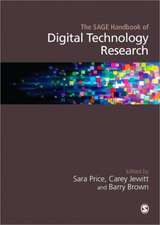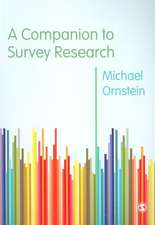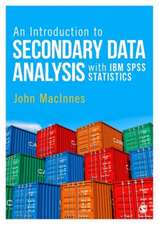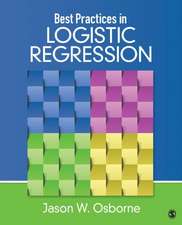Best Practices in Quantitative Methods
Autor Jason W. Osborneen Limba Engleză Hardback – 14 ian 2008
Advanced Best Practices, leading with logistic regression, and moving through IRT, Rasch Measurement, HLM, Meta-Analysis, and the inimitable area of Sampling; and
The Implications of Best Practices, including a discussion of the ethical implications of quantitative analysis.
Each chapter contains a current and expansive review of the literature, a case for best practices in terms of method, outcomes, inferences, etc., and broad-rangning examples along with any empirical evidence to show why certain techniques are better. The book encourages best practices in three very distinct ways: 1) Some chapters will describe important implicit knowledge to readers. For example, one of the most common data transformations is the square root transformation. Statistics and quantitative methods are filled with examples of these seemingly mundane aspects of research life that makes a substantial difference. Chapters in this book gather the important details, make them accessible to readers, and demonstrate why it is important to pay attention to these details. 2) Other chapters compare and contrast analytic techniques to give readers information they need to decide the best way to analyze particular data. For example, exploratory factor analysis has up to eight extraction methods, several rotation options, multiple ways to decide how many factors you have, and it is often the case that the options are not clearly described or discussed. Some of the chapters will examine instances where there are multiple options for doing things, and make recommendations as to what the ôbestö choice (or choices, as what is best often depends on the circumstances) are. 3) Finally, there are always new procedures being developed and disseminated. Many times (not all) newer procedures represent improvements over old procedures. Some chapters will present and explain new options for data analysis, discussing the advantages and disadvantages of the new procedures in depth, describing how to perform them, and demonstrating their use.This book is an invaluable resource for graduate students and researchers who want a comprehensive, authoritative resource to go to for practical and sound advice from leading experts in quantitative methods.
Preț: 1037.42 lei
Preț vechi: 1421.12 lei
-27% Nou
198.52€ • 212.28$ • 165.51£
Carte tipărită la comandă
Livrare economică 17 aprilie-01 mai
Specificații
ISBN-10: 1412940656
Pagini: 608
Dimensiuni: 178 x 254 x 38 mm
Greutate: 1.2 kg
Ediția:1
Editura: SAGE Publications
Colecția Sage Publications, Inc
Locul publicării:Thousand Oaks, United States
Cuprins
Chapter 1: The New Stats: Attitudes for the Twenty-First Century - Cherdsak Iramaneerat, Everett V. Smith, Jr., & Richard M. Smith
Part I: Best Practices in Measurement
Part I: Best Practices in Measurement - Jason Osborne
Chapter 2: Using Criterion-Referenced Assessments for Setting Standards and Making Decisions: Some Conceptual & Technical Issues - Thomas Kellow & Victor Willson
Chapter 3: Estimating Inter-Rater Reliability: Assumptions and Implications of Three Common Approaches - Gianluca Baio & Marta Blangiardo
Chapter 4: An Introduction to Rasch Measurement - Jason W. Osborne
Chapter 5: Applications of the Multi-Faceted Rasch Model - Peter R. Killeen
Chapter 6: Best Practices in Exploratory Factor Analysis - Jason W. Osborne
Part II: Selected Best Practices in Research Design
Chapter 7: Replication Statistics - Jason W. Osborne
Chapter 8: Mixed Methods Research in the Social Sciences - Wolfgang Viechtbauer
Chapter 9: Designing a Rigorous Small Sample Study - Bruce Thompson
Chapter 11: Best Practices in Quasi-Experimental Designs: Matching Methods for Causal Inference - Elizabeth A. Stuart & Donald B. Rubin
Chapter 12: An Introduction to Meta-Analysis - Ken Kelley, Keke Lai, & Po-Ju Wu
Chapter 12: Fixed and Mixed Effects Models in Meta-Analysis - Spyros Konstantopoulos
Part III: Best Practices in Data Cleaning and the Basics of Data Analysis
Chapter 14: Best Practices in Data Cleaning: How Outliers and "Fringeliers" Can Increase Error Rates and Decrease the Quality and Precision of Your Results - Edward W. Wolfe & Lidia Dobria
Chapter 15: How to Deal with Missing Data: Conceptual Overview and Details for Implementing Two Modern Methods - Naomi Jeffery Petersen
Chapter 16: Using Criterion-Referenced Assessments for Setting Standards and Making Decisions: Some Conceptual and Technical Issues - Jason C. Cole
Chapter 17: Computing and Interpreting Effect Sizes, Confidence Intervals, and Confidence Intervals for Effect Sizes - Elizabeth A. Stuart & Donald B. Rubin
Chapter 18: Robust Methods for Detecting and Describing Associations - Jason W. Osborne
Part IV: Best Practices of Quantitative Methods
Chapter 19: Resampling: A Conceptual and Procedural Introduction - Jason W. Osborne
Chapter 21: Advanced Topics in Power Analysis - Rand R. Wilcox
Chapter 21: Best Practices in Analyzing Count Data: Poisson Regression - Jason W. Osborne & Amy Overbay
Chapter 22: Testing the Assumptions of Analysis of Variance - Chong Ho Yu
Chapter 23: Best Practices in the Analysis of Variance - Jason W. Osborne
Chapter 24: Binary Logistic Regression - E. Michael Nussbaum, Sherif Elsadat, & Ahmed H. Khago
Chapter 26: Multinomial Logistic Regression - Yanyan Sheng
Chapter 27: Mediation, Moderation, and the Study of Individual Differences - David Howell
Chapter 28: Mediation, Moderation, and the Study of Individual Differences - A. Alexander Beaujean
Part V: Best Advanced Practices in Quantitative Methods
Chapter 30: Hierarchical Linear Modeling: What It is and When Researchers Should Use It - Carolyn J. Anderson & Leslie Rutkowski
Chapter 30: Best Practices in Analysis of Longitudinal Data: A Multilevel Approach - Cody S. Ding
Chapter 32: Best Practices in Structural Equation Modeling - Jason W. Osborne
Chapter 33: Introduction to Bayesian Modeling for the Social Sciences - Jason W. Osborne
Chapter 35: Measuring Accuracy in Psychological Research - Frans E.S. Tan
Chapter 37: Ethical Implications for Best Practices in Quantitative Methods - Ralph O. Mueller & Gregory R. Hancock
(Dropped) Chapter 4: Best Practices in Graphically Displaying Data - Jason W. Osborne, Anna B. Costello, & J. Thomas Kellow
(Dropped) Chapter 7: Choosing a Demoninator - Jessica T. DeCuir-Gunby
(Dropped) Chapter 9: Four Assumptions of Multiple Regression You Should ALWAYS Check - William D. Schafer
(Dropped) Chapter 28: An Introduction to Item Response Theory - Jason E. King
(Dropped) A Framework for Model Building in Social Science Research - Steve Stemler
Notă biografică
Jason W. Osborne is a thought leader and professor in higher education. His background in educational psychology, statistics and quantitative methods, along with that gleaned from high-level positions within Academia gives a unique perspective on the real-world data factors. In 2015, he was appointed Associate Provost and Dean of the Graduate School at Clemson University in Clemson, South Carolina. As well as Associate Provost, at Clemson University, Jason was a Professor of applied statistics at the School of Mathematical Sciences, with a secondary appointment in Public Health Science. In 2019, he took on the role of Provost and Executive VP for Academic Affairs at Miami University. As Provost, Jason implemented a transformative strategic plan to reposition the institution as one prepared for new challenges with a modern, compelling curriculum, a welcoming environment, and enhanced support for student faculty positions and staff. In 2021, he was named by Stanford University as one of the top 2% researchers in the world, underlining his commitment to world-class research methods across particular domains, ultimately influencing a generation of learners. Currently, Jason teaches and publishes on data analysis "best practices" in quantitative and applied research methods. He has served as evaluator or consultant on research projects and in public education (K-12), instructional technology, health care, medicine and business. He served as founding editor of Frontiers in Quantitative Psychology and Measurement and has been on the editorial boards of several other journals (such as Practical Assessment, Research, and Evaluation). Jason W Osborne also publishes on identification with academics and on issues related to social justice and diversity. He has written seven books covering topics to communicate logistic regression and linear modeling, exploratory factor analysis, best practices and modern research methods, data cleaning, and numerous other topics.


















